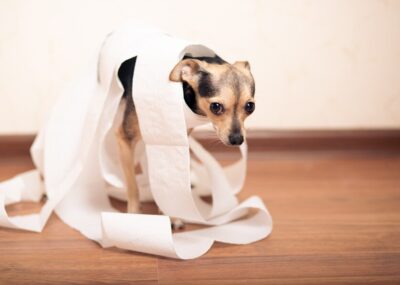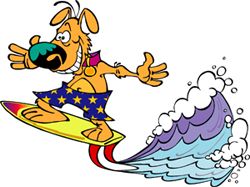 Once the settling in period is over there are a number of things you need to remember to do, and keep on doing, for your pup to stay healthy and happy.
Once the settling in period is over there are a number of things you need to remember to do, and keep on doing, for your pup to stay healthy and happy.
- Start toilet training
Start toilet training from the word go but bear in mid that most pups will be 3-4 months old before they are fully trained.
from the word go but bear in mid that most pups will be 3-4 months old before they are fully trained. - Behavioural training.
Start gently with behaviour training. You can be firm with your pup but remember to be consistent. Start gently. Use your pup’s name frequently when interacting, but try not to use it in reprimand as you want them to respond to their name in a positive way. Be reasonable but determined about how you want your pup to comply, as making compromises at this stage can store up trouble for later. It is a good idea to ban your pup from the sofa / bed as the higher up it is, the more dominant they can feel in the family. Try to have clearly defined human only areas, for example you may decide not to let your pup go upstairs. You should be able to remove a food bowl at will when your pup is eating. Also familiarise them with the idea that they should allow you to examine feet, ears and mouth. Get them used to regular grooming. Click here for a list of behaviourists. - Obedience training.
Start training early before bad habits develop. The main two areas covered are; learning to walk properly on the lead and coming/staying when instructed. Make the sessions short (initially a few minutes), use short command words and give them praise when they respond correctly. The learning curve will depend on the amount of time and patience you can give. Obedience classes are available and can be very useful in reinforcing training and also helps your pup interact properly with other dogs.
and coming/staying when instructed. Make the sessions short (initially a few minutes), use short command words and give them praise when they respond correctly. The learning curve will depend on the amount of time and patience you can give. Obedience classes are available and can be very useful in reinforcing training and also helps your pup interact properly with other dogs.
Click here for a list of trainers. - Choose a good food for your pet.
You really will see the difference if you buy one of our premium brands. The coat will shine and it will be a whole lot easier to clean up after your pet; there will be less faeces, less flatulence and less mess! Those are the benefits you can see for yourself, but a healthy diet does contribute to a healthy body. We recommend that you choose a dried food, as it is better for your pet’s teeth and is also much cheaper for you! After 3 months of age 3 meals a day should be plenty. After 6 months, two meals. After 1 year old many dogs are happy with 1 large meal a day. - Parasites
Worm your pup regularly. Initial worming should be every 2-4 weeks until 6 months old and then every 3 months after that. Pups are especially susceptible to the common roundworms and can become ill if worming is neglected. These worms can, in rare cases, also cause serious health problems for children
and can become ill if worming is neglected. These worms can, in rare cases, also cause serious health problems for children , so vigilance is important. Faeces should be collected and disposed of carefully. There is a high prevalence of tapeworms
, so vigilance is important. Faeces should be collected and disposed of carefully. There is a high prevalence of tapeworms in pups, particularly if fleas are present. The traditional wormers are proving to be increasingly ineffective in the control of internal parasites. We have chosen Milbemax as our standard prescription wormer
in pups, particularly if fleas are present. The traditional wormers are proving to be increasingly ineffective in the control of internal parasites. We have chosen Milbemax as our standard prescription wormer  as it also helps control a dangerous worm which is found in slugs and snails (many dogs will gobble up these chewy garden treats!)De-flea and de-tick your pup.
as it also helps control a dangerous worm which is found in slugs and snails (many dogs will gobble up these chewy garden treats!)De-flea and de-tick your pup.
Fleas can be transmitted between cats and dogs. Flea bites can cause irritation and in some cases allergic reactions. A flea comb can be used regularly to check for fleas. Ticks
can be transmitted between cats and dogs. Flea bites can cause irritation and in some cases allergic reactions. A flea comb can be used regularly to check for fleas. Ticks can also cause skin irritation and are picked up in fields and heathery or overgrown terrain. The most effective control is the monthly application of a prescription ‘spot on’
can also cause skin irritation and are picked up in fields and heathery or overgrown terrain. The most effective control is the monthly application of a prescription ‘spot on’  which consists of a small amount of fluid that is applied to the back of the neck. Medicated shampoos, traditional sprays and flea collars are all becoming increasingly ineffective. All pets in the house should be treated at the same time. We stock a range of ‘Spot-ons’ in the vet hospital.
which consists of a small amount of fluid that is applied to the back of the neck. Medicated shampoos, traditional sprays and flea collars are all becoming increasingly ineffective. All pets in the house should be treated at the same time. We stock a range of ‘Spot-ons’ in the vet hospital. - Get a health check and a complete vaccination course
Get a health check and a complete vaccination course at an early stage as this will enable your pup to start interacting with others without taking unnecessary risks of contracting contagious diseases. Most of the socialisation process takes place takes place within the first three months. Your pup will need a yearly health check and vaccination . Other vaccines that may be of interest are: canine kennel cough vaccine (requirement for admission to most boarding kennels) and rabies vaccine (required for the pet passport scheme if you want to travel abroad with your pet)
. Other vaccines that may be of interest are: canine kennel cough vaccine (requirement for admission to most boarding kennels) and rabies vaccine (required for the pet passport scheme if you want to travel abroad with your pet) - Micro-chipping is a great idea.
The chips are small and easily inserted under the skin. They greatly increase the chances of your dog being returned to you should it be lost/ stolen. Click here for more details .
. - Pet insurance is now an integral part of animal healthcare in Ireland.
We strongly recommend you consider taking out an insurance policy for your pet. Frequently we find ourselves in the position of treating pets in a less than ideal way due to financial constraints. The diagnostic and treatment procedures we use in veterinary medicine have greatly advanced in recent years. Along with these advances the cost of veterinary care has also significantly increased. - Neutering is an important part of responsible pet ownership.
We recommend that dogs which are not intended for breeding are neutered . This day procedure is carried out at 5 1/2 months old for females and 9 months old for males. There are medical, behavioural and animal welfare reasons for this advice. A female neutered before her first heat is 2000 times less likely to develop mammary cancer. She will also be safe from the risk of dangerous uterine infections. The risk of prostate disease is greatly reduced by neutering male dogs. They are also much less likely to develop dominance aggression, habitual straying and frequent urine marking if neutered at an early stage.
. This day procedure is carried out at 5 1/2 months old for females and 9 months old for males. There are medical, behavioural and animal welfare reasons for this advice. A female neutered before her first heat is 2000 times less likely to develop mammary cancer. She will also be safe from the risk of dangerous uterine infections. The risk of prostate disease is greatly reduced by neutering male dogs. They are also much less likely to develop dominance aggression, habitual straying and frequent urine marking if neutered at an early stage.
- FUN, FUN, FUN
Make sure you give your new pup plenty of fun and exercise . Dogs need regular walks / runs. If they are not given this outlet, compulsive / destructive behaviour can result. A note of caution for the rapidly growing large breed dogs ; no prolonged, heavy exercise (especially not on hard surfaces) until the joints are fully developed at full maturity.
. Dogs need regular walks / runs. If they are not given this outlet, compulsive / destructive behaviour can result. A note of caution for the rapidly growing large breed dogs ; no prolonged, heavy exercise (especially not on hard surfaces) until the joints are fully developed at full maturity.
